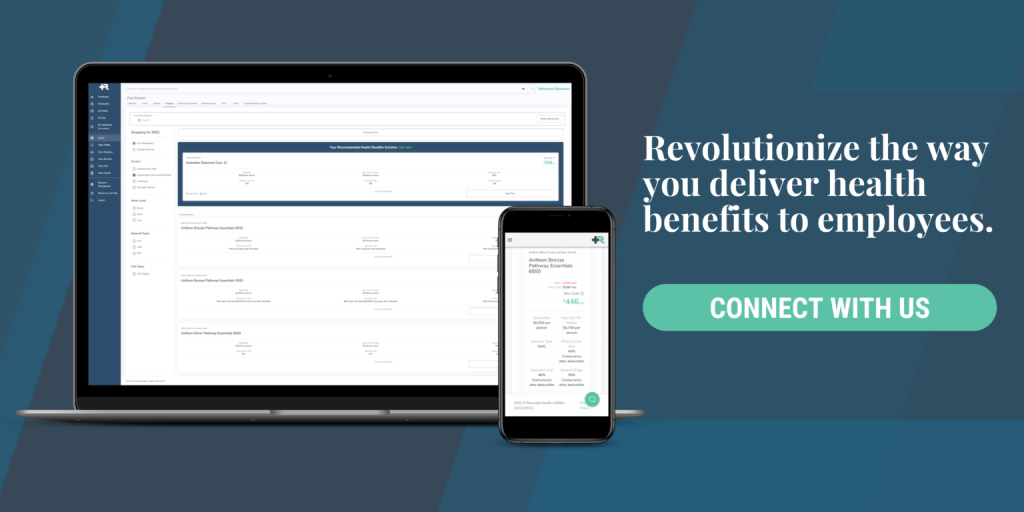Choosing the Best Health Benefits: ICHRAs vs. Self-Funded Plans
By Mallory Meyer on Nov 5, 2024 12:20:00 PM

Choosing the right health benefit plan for your business can feel overwhelming with so many options available. From traditional group plans to modern alternatives like ICHRA and self-funded plans, how do you decide which is best for your organization? Each option offers unique benefits, but understanding the differences is key.
Health benefits play a critical role in attracting and retaining top talent, as well as managing healthcare costs effectively. While traditional group plans provide simplicity, they may lack the flexibility and customization that today’s workforce values.
Alternatives like ICHRA and self-funded plans allow businesses to tailor benefits to meet diverse employee needs while maintaining financial control.
In this guide, we’ll break down the essential aspects of ICHRA and self-funded plans. You’ll gain insights into their advantages, challenges, and how to choose the best fit for your company’s culture, goals, and workforce. Let’s dive into the details!
Understanding Health Benefits Plans
Health benefits are an essential part of supporting employees and managing medical expenses. Traditional group health plans have long been the standard, but many businesses are now exploring alternative options like Individual Coverage Health Reimbursement Arrangements (ICHRAs) and self-funded plans. These modern approaches offer flexibility that traditional group health plans often lack.
Why does this matter for your business? The right health insurance plan can significantly impact employee satisfaction and retention. When employees feel secure in their healthcare options, they’re more likely to stay engaged and loyal.
Cost is another crucial factor. Traditional plans can be expensive and unpredictable, while alternatives like ICHRAs and self-funded plans allow for better cost control and customization. Balancing affordability and employee needs is key.
Factors Affecting Health Plan Decisions
- Employee Demographics: Consider the age, family status, and specific healthcare needs of your workforce to ensure the plan meets diverse requirements.
- Budget Control: Evaluate how predictable and manageable the costs are to maintain financial stability while offering meaningful benefits.
- Regulatory Compliance: Ensure the plan adheres to healthcare regulations to avoid legal challenges and penalties.
- Plan Flexibility: Look for options that allow customization to meet the varying needs of different employee groups.
- Sustainability: Choose a health insurance plan that aligns with long-term goals and adapts as your business grows.
Introduction to Individual Coverage HRAs (ICHRAs)
ICHRA is reshaping how businesses approach employee healthcare. Introduced as a flexible alternative to traditional plans, ICHRAs allow employers to reimburse employees for health insurance premiums and other qualified costs. They’ve gained popularity for their adaptability and cost control.
How did ICHRAs become such a popular option? As businesses sought alternatives to one-size-fits-all plans, ICHRAs emerged to provide personalized solutions. In a workplace setting, employers allocate a set reimbursement amount to eligible employees, who then choose their own health insurance plans. This allows employees to work directly with the insurance company of their choice, ensuring they find coverage that fits their unique needs.
Eligible costs under ICHRAs include:
- Health insurance premiums
- Out-of-pocket medical expenses
- Prescription medications
- Co-pays and deductibles
With ICHRAs, employers can tailor health reimbursement arrangements to align with their budget while empowering employees with control over their healthcare decisions. It’s a win-win for both parties.
Read More | A Comprehensive Guide to ICHRA Rules
Self-Funded Health Plans Explained
Self-funded health plans are a popular option for businesses looking to take more control over their health insurance costs. Unlike traditional group plans, where an insurance company manages the risk and coverage, self-funded plans allow employers to pay directly for their employees’ medical claims. This approach can lead to potential cost savings, especially for businesses with younger and healthier workforces.
The key difference is in flexibility. With self-funded plans, employers design their own coverage, tailoring it to meet employee needs while controlling expenses. For example, a mid-sized tech company might decide to offer comprehensive coverage for preventive care, recognizing that proactive healthcare keeps employees healthier and more productive.
However, self-funded plans are subject to specific regulations. Employers must comply with the Employee Retirement Income Security Act (ERISA) and the Health Insurance Portability and Accountability Act (HIPAA) to ensure privacy and fairness. Additionally, they need stop-loss insurance to manage unexpected high-cost claims. Self-funded plans can be a smart choice, but they require careful planning and management to succeed.
Comparing ICHRAs and Self-Funded Plans
When choosing between ICHRA and self-funded plans, it’s important to understand how they differ in key areas. Each option offers unique advantages, depending on a business’s goals and employee needs.

Financial Commitments and Flexibility
ICHRAs allow employers to set defined monthly allowances, offering predictability and control over costs. Self-funded plans, on the other hand, involve paying medical claims as they arise, which can lead to fluctuations in expenses. For a small business owner who values stable budgeting, ICHRA may feel less risky compared to the variable nature of a self-funded health plan.
Employee Accessibility and Flexibility
ICHRAs empower employees to choose individual health plans that suit their unique needs. Self-funded plans typically offer one or two standardized options for everyone. For a workforce with diverse preferences, ICHRAs often deliver more flexibility and satisfaction.
Pros and Cons of ICHRAs
ICHRAs provide valuable opportunities for employers and employees alike. For employers, the flexibility of setting defined monthly allowances through employer contributions simplifies budget management. It allows them to control healthcare costs while offering meaningful support.
Employees benefit from the freedom to select individual health insurance premiums that align with their unique needs and preferences, making healthcare more personalized. Additionally, ICHRAs work well with health savings accounts (HSAs), enabling employees to save pre-tax dollars for medical expenses. This combination can lead to greater financial security and long-term health planning for workers.
Challenges and Limitations of Self-Funded Plans
Self-funded plans require employers to shoulder more risk. High-cost claims, such as unexpected surgeries, can strain budgets if not managed carefully. Stop-loss insurance can mitigate this risk, but it adds another layer of complexity.
Additionally, self-insured health plans demand administrative oversight. Employers must handle claims processing and compliance with regulations, which can be daunting. However, partnering with experienced administrators or third-party services can ease the burden and make self-funded plans a sustainable choice.
Learn more about how Remodel Health’s ICHRA+® can benefit your organization
Financial Analysis of ICHRAs
ICHRAs offer businesses a way to control costs while providing tailored health benefits. Employers set fixed reimbursement amounts, reducing financial risk compared to fully insured health plans. This predictability allows businesses to plan budgets effectively without worrying about unexpected premium hikes.
For growing businesses, ICHRAs provide financial flexibility. As teams expand or employees’ needs shift, reimbursement amounts can be adjusted. This ensures that health benefits evolve alongside the organization, making ICHRA eligibility an adaptable solution for dynamic workforces.
Tax Benefits for Employers and Employees
One of the standout advantages of ICHRAs is the tax savings. Employer contributions are tax-free, reducing payroll taxes while maintaining meaningful support for employees. Employees, in turn, benefit from tax-free reimbursements for individual health insurance premiums and wellness programs.
For example, a small nonprofit with 20 employees could save $15,000 annually in payroll taxes by switching to an ICHRA. Similarly, a mid-sized retail company offering tax-free reimbursements could help employees save an average of $200 each month on health-related expenses.
These tax benefits make ICHRAs a cost-efficient option that benefits both employers and employees, fostering financial well-being across the board.
Read More | ICHRA for Enterprise Organizations
Financial Analysis of Self-Funded Plans
Self-funded plans offer employers the ability to pay for healthcare costs directly, which can provide savings but also introduce cost variability. Unlike a group health plan with fixed premiums, self-funding means covering claims as they arise. This can be advantageous during low-claim periods but may lead to higher-than-expected expenses when claims surge.
Financial risks are an inherent part of self-funded plans. High-cost claims or unexpected medical events can quickly strain budgets. Employers often purchase stop-loss insurance to manage this risk, but the additional expense must be factored into the overall cost analysis.
Tax Implications and Savings Potential
Self-funded plans also come with tax advantages. Employers avoid paying state insurance premium taxes, which are typically required with group health plans. This exemption can lead to notable savings, especially for larger organizations. Additionally, funds set aside for claims remain under the employer’s control, potentially earning interest or being repurposed if unused.
Compliance and Legal Considerations
Both ICHRAs and self-insured plans come with specific regulatory requirements that employers must follow. For ICHRAs, compliance includes ensuring the health care plans chosen by employees meet Affordable Care Act (ACA) standards. Employers must also track reimbursements accurately and provide clear communication about plan rules and cost-sharing arrangements to eligible employees.
Self-insured plans require adherence to regulations like ERISA and HIPAA. These rules govern everything from claims processing to maintaining employee privacy. Employers must also carefully manage stop-loss insurance and other safeguards to avoid unexpected legal complications.
Potential legal risks for both plan types include noncompliance with reporting standards or disputes over plan coverage. Mitigating these risks involves thorough documentation, regular audits, and working with experienced third-party administrators.
Recent legislation, such as updates to the ACA and changes in cost-sharing limits, continues to shape how employers approach health benefits. Staying informed about these changes ensures that ICHRAs and self-insured plans remain compliant while still meeting the diverse needs of employees.
Choosing Between ICHRAs and Self-Funded Plans
Selecting the right health benefits plan starts with assessing your company’s size and workforce demographics. Smaller businesses may prefer the predictability of ICHRAs, while larger organizations with a stable employee base might find self-funded plans more cost-effective. Understanding the unique needs of your team ensures that their healthcare options align with their priorities.
Evaluating financial resources and risk appetite is equally important. Companies with limited budgets or low tolerance for fluctuating expenses may benefit from the stability of a fully insured health plan or ICHRA. Those with more flexibility and the ability to manage higher-risk scenarios could explore self-funding.
Aligning health benefits with your company culture and goals is key. Organizations prioritizing personalization might favor individual health insurance plans through ICHRAs, while those aiming for streamlined solutions might lean toward a group plan.
Decision Framework
- Assess your workforce size and demographics.
- Evaluate financial resources and risk tolerance.
- Consider customization needs for employee satisfaction.
- Align the plan with long-term company goals.
- Seek expert advice to ensure compliance and sustainability.
By using this framework, businesses can confidently choose a plan that supports their team while maintaining financial and cultural alignment.
Monitoring and Adjusting Health Benefits Over Time
Health benefits should evolve alongside your organization. Regularly tracking employee satisfaction and health needs is essential. Surveys, feedback sessions, and usage reports can help identify whether current offerings are meeting expectations.
Financial performance monitoring is equally important. Assess the costs of ICHRA and self-funded plans against their impact to ensure they remain efficient without adding an administrative burden. Identifying trends early can prevent unexpected financial strain.
Long-term sustainability requires evaluating how well your plans align with both employee needs and business goals. Adjusting benefits as your workforce changes, such as shifting from a self-funded plan to ICHRAs for a growing remote team, ensures continued relevance.
Employees appreciate having choices in their health benefits. With ICHRA, they select plans that fit their lifestyles, which can lead to increased satisfaction and improved retention.
Choosing Between ICHRA and Self-Funded Plans Simplified
Deciding between ICHRA and self-funded plans comes down to your business’s needs and priorities. Both options offer unique advantages and challenges, making it crucial to align your choice with your workforce, financial goals, and long-term strategy.
ICHRA provides predictable costs and empowers employees with personalized health benefits. Self-funded plans, meanwhile, offer flexibility and potential savings for businesses willing to manage greater risk.
Regular evaluation of employee satisfaction, financial performance, and compliance ensures your plan stays effective. Adjusting health benefits as your business evolves can keep your team engaged and your organization thriving.
Need guidance on navigating ICHRA and self-funded plans? Remodel Health is here to help. Explore tailored solutions and expert support to make confident, informed decisions for your team’s healthcare needs.
Get expert help with Remodel Health today.
Check out more resources
See these related articles

Individual Health Insurance vs. Traditional Group
Remodel Health explains how individual health insurance plans are the superior choice and why traditional group plans are a thing of the past.

Embracing ICHRAs for Small Businesses
Remodel Health explains the benefits of ICHRAs for small businesses and how to get started using three simple steps.

Who can use an ICHRA?
Learn who is eligible for ICHRA and how it works. Discover which employees can participate and what employers need to know about offering ICHRA.

